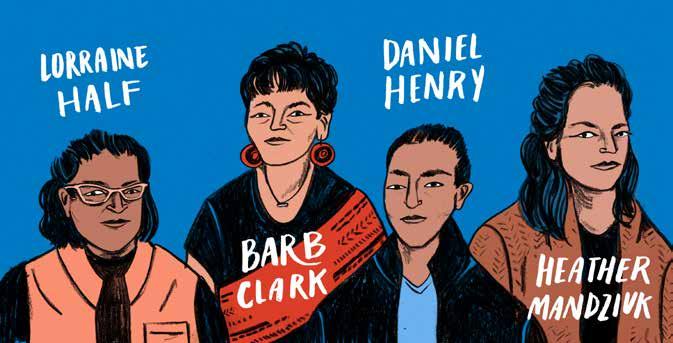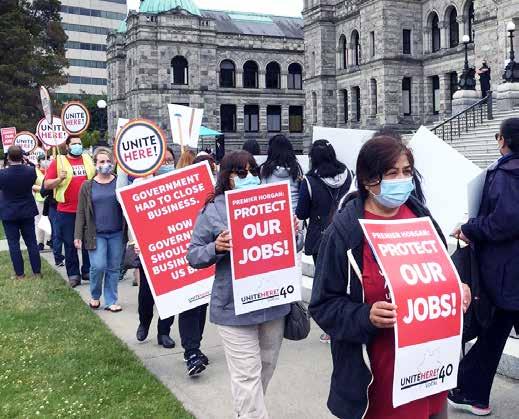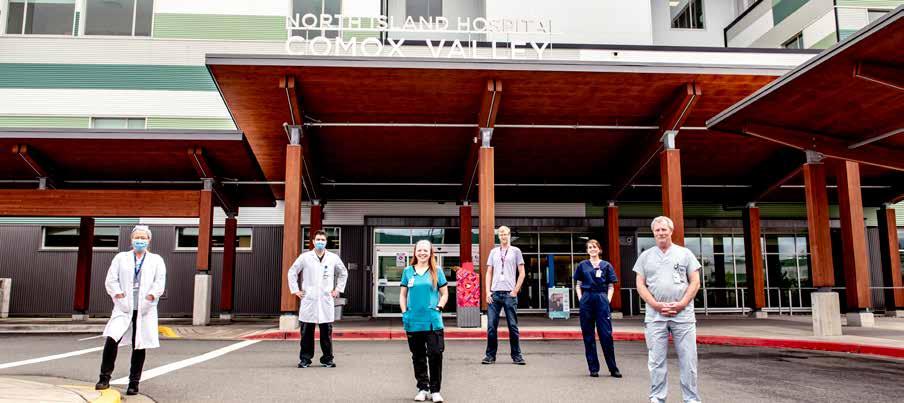LABOUR
News from here and around the world
JOB SECURITY
Industry shutdowns strike vulnerable workers first WHEN TRAVEL restrictions were imposed during the pandemic, 90 per cent of B.C.’s hotel workers were laid off. “Tens of thousands of housekeepers, servers, cooks and dishwashers in the hospitality industry immediately found themselves without livelihood, with no guarantees of being able to return to work,” says Michelle Travis of UNITE HERE Local 40, a union that represents hospitality workers. Government support programs, like the Canada Emergency Response Benefit (CERB), provided workers with some temporary relief. But the pandemic quickly exposed how vulnerable those in low-wage, precarious jobs are in this country. Both public and private sector unions have long sounded the
Half of those who work in the lowest-paid jobs lost work or hours during the pandemic. alarm about the steady decline of wages and working conditions that have accompanied the rise of more low-wage, part-time, and “gig” jobs. “We’ve known for years that work is being transformed in Canada,” says Jim Stanford, director of the
Centre for Future Work. “We’re moving from more standard, stable jobs towards a model of precarious, ‘just-in-time’ staffing, where workers are treated as disposable.” The large-scale shutdown of parts of our economy were important public health measures. But the negative impacts were not equally shared. The Canadian Centre for Policy Alternatives (CCPA) found that half of those who work in the lowest-paid jobs ($14 an hour or less) lost work or hours during the pandemic. Among those who earn $48 an hour or more, only one per cent lost work or hours. According to Iglika Ivanova, senior economist at CCPA, 75 per cent of those who lost their jobs in B.C. between February and May worked in one of five industries: accommodation and food services; retail; construction; information, culture and recreation; and “other services” (which include personal services, repairs and maintenance, domestic workers, most charities and non-profits). “Young workers, women, immigrants and racialized workers make up the majority of workers in the lowest-paying and most precarious jobs in our economy,” says Ivanova, “And they have borne the brunt of the economic fallout from the pandemic so far.” Workers in precarious jobs can also face greater health risks, with inadequate sick leave provisions, high exposure to the public, and
Michelle Travis PHOTO
Precarious jobs at greatest risk
PROTECT OUR JOBS | Hotel workers from UNITE HERE Local 40 demonstrated at the B.C. Legislature in Victoria July 7, asking government to guarantee that laid-off hotel workers will have the legal right to return to work.
the need to work multiple jobs to make ends meet. A recent Centre for Future Work report outlined an economic rebuilding plan that recommends better standards and protections for precarious workers. As for the UNITE HERE Local 40 hotel workers, they fear their employers may not rehire those who were laid off during the pandemic, choosing instead to replace them with new employees who may cost companies less in wages,
benefits and seniority. “Laid-off workers need a legal right to return to their jobs as the industry recovers,” said Travis. “Employers should not be using the pandemic as an excuse to replace them.” UNITE HERE Local 40 is calling for provincial legislation that will require B.C. employers to rehire those laid-off workers, as well as federal programs to better protect workers. THI VU
VOICES
Addressing Racism Investigation Survey IN JUNE, British Columbians heard about a deeply disturbing racist game allegedly being played in one or more B.C. hospital emergency rooms. This prompted an independent investigation into Indigenous-specific discrimination in our health care system. It should come as no surprise that the health care sector is not immune to the racism and discrimination, and specifically as directed against Indigenous people, that exist in society. So, when my team set out to conduct an investigation, it was not to determine whether or not racism exists in the health care system, but rather the scope and extent of it. The health care sector has a unique role to play in helping people when they most need it. But when that system discriminates against any group of peo10 GUARDIAN | Summer Fall/Winter 2020 2018
The health care sector is not immune to racism and discrimination.
ple, then trust and confidence the public has in that system is shattered. This investigation does not set out to blame and shame. But rather, it provides the health care sector with an opportunity to learn and do better. We recently launched a survey asking for the experiences of a wide range of health care workers. Our survey asks health care workers the impact of discriminatory behaviours or actions on patients and their family members. But it also asks in what ways health care workers are affected personally in the workplace by racism and discrimination. This is an opportunity for all of us to find ways of better delivering health care in our province. Mary Ellen Turpel-Lafond is leading the Addressing Racism investigation. Find out more at https://engage. gov.bc.ca/addressingracism/



